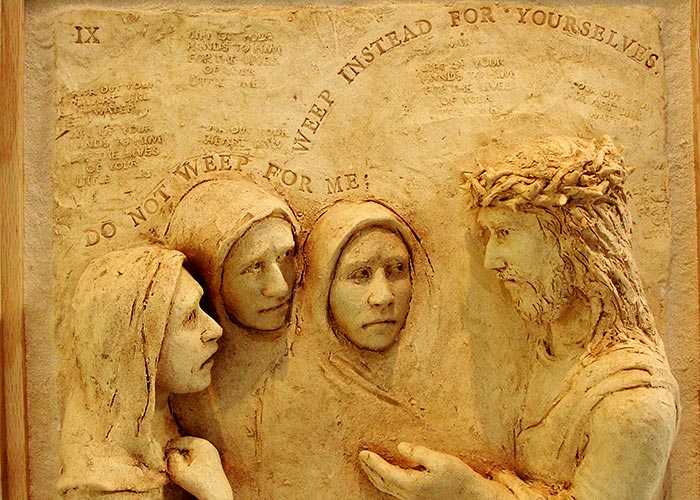The Way of the Cross is a popular devotion during Lent, allowing us to plumb the depths of the Paschal Mystery. It is a challenging discipline that reminds us of the details of Christ’s suffering, for while most of his disciples had scattered, there were many who did gather to be near him along the difficult journey of his Passion.
Most of the Stations of the Cross reveal some dimension of the joy to follow: for example, Simon’s assistance would prove the source of tremendous grace for him and his family, Jesus’ determination to continue his salvific work despite three horrific falls provides a lesson in perseverance (as well as revealing the depth of his love for us), and Veronica’s gesture of consolation reminds us that compassion for those who suffer leaves a divine imprint on our lives.
But the Eighth Station isn’t ordered towards renewal and reward, rather, it carries a pall of apprehension and foreboding. Christ’s assurance to the good thief of impending bliss stands in stark contrast to the message he left to the weeping women along the Via Dolorosa, “Daughters of Jerusalem, do not weep for me, but weep for yourselves and your children. For indeed the days are coming when people will say: ‘Blessed are the barren, the wombs that never bore and the breasts that never nursed.’ At that time, people will say to the mountains, ‘Fall on us!’ and to the hills, ‘Cover us!’ for if these things are done when the wood is green what will happen when it is dry?” (Lk 23: 27-31). Far from being words of comfort, anyone hearing them should be aghast, pondering what might be worse than the event those women were witnessing.
It is natural to simply bask in the joy of the Resurrection, being relieved that the season of revisiting Jesus’ suffering has come to such a fruitful end. But now is an essential time to stop and reassess that encounter. Our Lord spoke about children on various occasions, two of which are clearly related to the concern at hand. Once, despite the disciples’ scolding, Jesus encouraged parents to bring their little ones to him for his blessing (cf. Mt 19:13-15); and then in contrast we hear a warning, “Whoever causes one of these little ones who believe in me to sin, it would be better for him to have a great millstone hung around his neck and to be drowned in the depths of the sea. Woe to the world because of things that cause sin! Such things must come, but woe to the one through whom they come!” (Mt 18:6-7)—one of the harshest admonitions in the entire New Testament.
Both the invitation and the warning should give us pause, for they appear to illuminate his comment to the women on his path. The life-giving promises on offer will prove beyond the grasp of those who harm impressionable children. Moreover, it is not beyond reason to assume that the harsh punishment for such abusers is because the scandal they cause can create such a destructive trajectory for their victims that salvation may elude their grasp as well—why else would Christ express such ire?
We have to take this seriously, and reassess those things that we allow to influence our children. The corrosiveness in our culture has reached explosive levels—in the schools, in all media outlets, and in the pernicious social constructs that are destabilizing developing minds. No family is safe at the present time from the hideous perversions sweeping our society, and no adult encountering them can fathom the shattering effects they have on children, who thrive best on stable relationships and bedrock truths.
We cannot shrug this away or hope for the best. Whatever safeguards we count on for our own children are upended by “a landscape with dragons” seeking to devour them and their peers at every turn. The psychological, academic, and physical harms are certainly toxic, but the spiritual harm was frightful enough for Our Lord to prescribe a time of weeping—even as he conquered death. If we want our children and grandchildren to share in that victory, then those dragons must be chained through every means possible.

Recent Comments